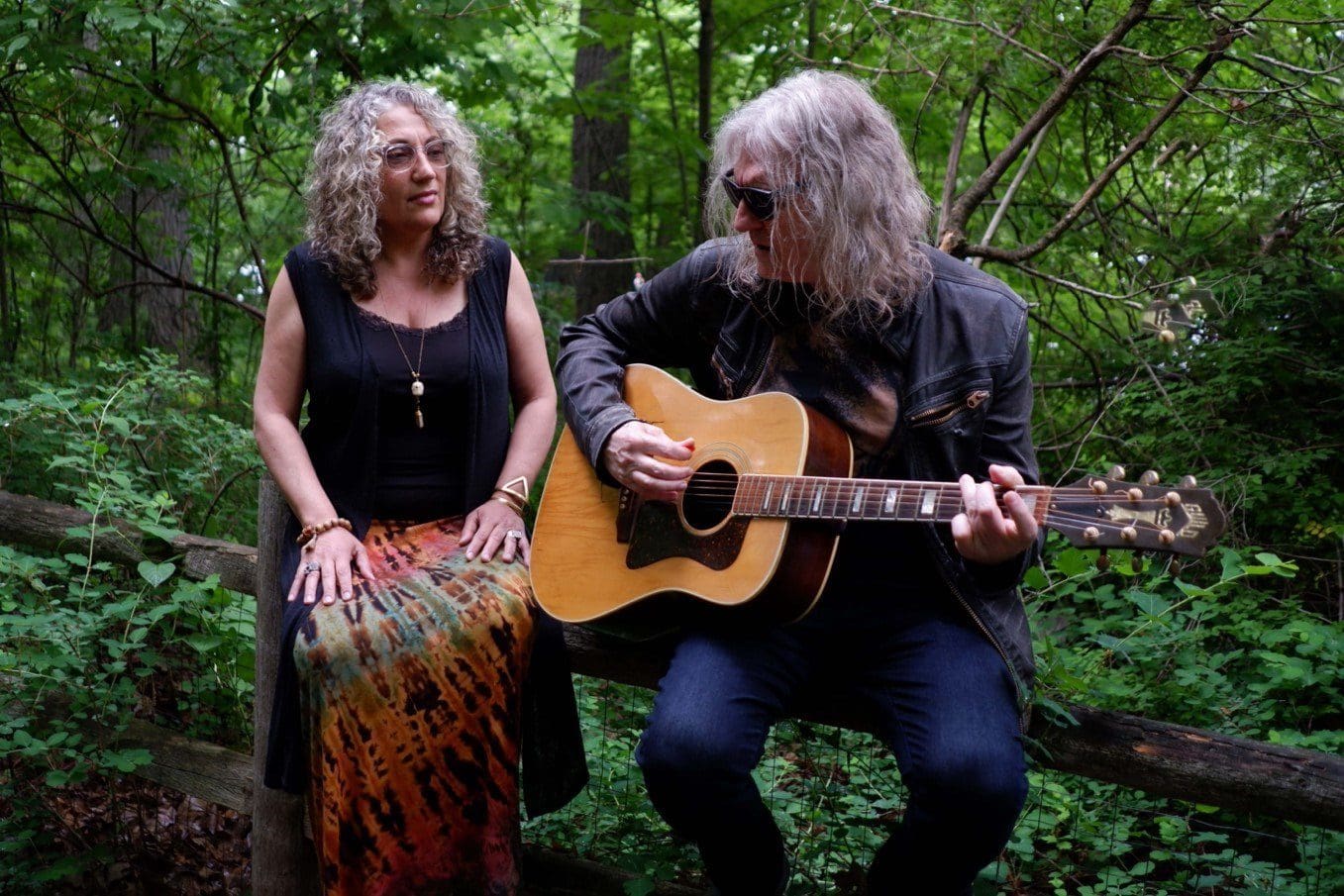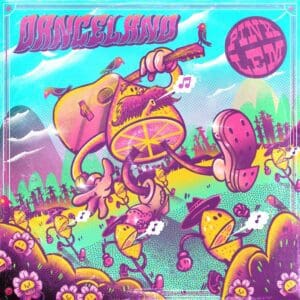
In recent years, the jam band community has proven more valuable than ever, both to fans and the musicians themselves. As a continent-spanning phenomenon, it helps keep people connected through the rough times, more closely and directly than ever. Recently, I spoke with Danceland front man Joe Ferland about the legacy of the Grateful Dead, his recent comeback to music, the wonderful jam community, and much more.
However, before we get into the interview, Pop Break is proud to premiere Danceland’s new single, ‘Not Without a Fight’ — a protest song in support of BLM, abused women, homeless kids, indigenous people, and LGBTQ+.
When we spoke with Joe Ferland, he said this about the single:
“This tune is a reaction to the constant injustice suffered by innocent people just trying to live their lives,” explains founding guitarist and singer-songwriter Joe Ferland. “It was inspired by a culmination of events including the killings of Breonna Taylor and George Floyd and the horrific stories surrounding indigenous children in residential schools here in Canada.”
Andrew Howie: You’re a jam band guy who grew up a Deadhead. What is it about their music, in your opinion, that continues to inspire musicians decades later?
Joe Ferland: I would say it’s a combination of a few things, but the catalog of songs, the originals they wrote, is amazing in my opinion, as was their selection of covers. Plus they keep releasing live shows, and it’s almost like going to a new show every time they do. Sometimes they come out with specialty sets and things like that that I’ve never heard before, and I think that’s part of what keeps up the mystique; so many recorded shows in their library and there are still all these new ones coming out. When one of those drops, it’s a new experience, and you go through it all again.
AH: So you’re about to hit the road again fairly soon here; what are some notable dates and what has you excited about this tour?
JF: We’re doing a northeast tour in October, one date locked, October 6th in New York City at this small place, The Parkside Lounge. We have a bunch of dates up in the air that I’m still trying to lock in, but one big one is the August 6th album release party in Toronto Island Marina. Great venue, overlooks the city, really nice. Then we’re continuing to book shows in Canada through the end of the year.
Other than that, we’re trying to hit some of the favorite jam band haunts, Ironworks in Buffalo, Nectar’s in Vermont, seeing if we can get those places, Stone Pony in Jersey. In different incarnations, we’ve played around NYC, Philly, Boston, Jersey Shore, the surrounding area, y’know. We definitely have people that will come out and see us on familiar ground, but we’re trying to mix it up with some new spots. The place we’re playing in NYC is a place we played years ago, and we’re looking forward to that. Ironworks has been interested in having us; Buffalo Ironworks means a lot for our Toronto jam band community, because a lot of the jam bands don’t cross over into Canada, but they do play in Buffalo, so we’ve gone to see lots of great shows there, it’s a cool place.
AH: What can you tell me about how this album Pink Lem came together that might be different vs. how you might have put something together in your early years?
JF: I think it came together a little more organically. Not that I was forcing anything back in the day, but we were writing for a goal: to try to get record deals. This time around we started as a cover band, and when the pandemic hit, I was lying in bed at night with songs coming to me, ideas for lyrical content, etc. I started letting it happen and it’s weird, because I never really work through songs in my head like that, and now I’ve been doing it for the last three years. It’s been a little more organic; we’re not doing it for anyone other than our band and our community, and getting it out there and seeing what we can make happen is our only goal. I just said to my wife, who is in the band, “Let’s just go make records of stuff that we’re writing that we love,” and I’m hoping people love it too!
AH: Did you find that your setting influenced how you wrote any of this music?
JF: When I started writing again it was in Toronto, and I had a couple ideas that we were fleshing out. We have a place in Bayfield, Ontario. When the pandemic was starting up, we figured we would be locked up for a while, so we headed out there, it’s right on a lake, and it was amazing. Lots of ideas came to me. The perfect setting to kind of flesh out tunes and our friend across the street finished a recording studio. We had these tunes, there’s the studio, let’s put the two together and make a record.
AH: Sort of a chance happening in some ways. Can you talk about the way chance affects one’s path in spite of our best laid plans? A few moments from your bio stood out to me, the hour of Dead music on the radio during your drive, you meeting your wife, etc.
JF: I think chance affects every aspect of being a musician. Back in the day, you would put out ads looking for musicians, and that is a total chance thing. Sometimes you meet people through friends or other musicians, and that brings a little different taste to your ears. You mentioned the hour block of Dead; I had not been hardcore listening to the Dead for a while, and we had been out of playing live shows for a couple years. I was driving around just listening to it, and it was like comfort food. It was near the end of my mother’s life, and the music really spoke to me and this light went on. I thought, “I can definitely do Dead covers. That would be amazing.” But also more recently by chance, like you said, I did not plan on writing tunes or an album or doing original music; I just let it happen and it’s been an amazing experience getting back into the whole process of writing, recording and releasing an album.
AH: Your bio also mentioned that back in the day you were getting a little burnt out with the music industry hustle and whatnot. What would say has alleviated, for lack of a better term, some of that pressure?
JF: I try to distance myself from getting into the whole song and dance of trying to shop to labels and all that. We’ve contacted some people here and there that we know, but maybe that’s what’s different for me; I’m not relying on a major label, indie label or anything like that, because I know we can do it ourselves. It was a little tougher in the early 2000s when we were touring, and we would have to send CDs to newspapers and college radio and really try to pound it that way. These days you can really target people and get your music and message to them a lot more quickly than 20 years ago. I think there is more accessibility for musicians to get their music listened to and get a platform.
AH: In your opinion, what are some good ways to move past some of the outside pressure and expectations as an artist?
JF: I think you have to trust your ears, trust what you’re doing and trust that what you’re hearing and what you like is going to transfer to other people. When you’re in a music scene with a bunch of bands and you all are kind of doing the same type of genre, trying to outdo each other, song-wise or performance-wise, it can get weird, but it’s not like that in our community. It’s more cohesive, more supportive. Everyone supports each other in the jam band scene. We’ve played with a ton of different artists, and I kind of like it because we get a different take on the song with a different keyboardist and bassist. Like you said, there are no expectations. It’s not like we are putting out this record trying to sound like anything other than what it sounds like.
AH: Speaking of your sound, do you ever find that working with an open-door policy of keyboardists and bassists affects your music? Do you adjust to them or do they adjust to you?
JF: It’s a little of both. We’ve played with a handful of musicians on both keyboards and bass, and we sometimes go back to them, so we’ll hook up with a duo and we know what to expect. For the August 6th show at Toronto Island Marina though, we’re actually bringing in a pair, a keyboardist and bassist, that we’ve never played with before. They’re kind of new to the scene as part of a Dead cover band. They were into playing and I’m excited to see how it goes with these guys.
AH: We’ve talked a lot about the jam band community; do you find there are any major differences in the scene between the US and Canada?
Not really. I took my wife to the Fare Thee Well shows in 2015 at Soldier Field, and it was cool! We were talking around town, a bunch of people had their Dead shirts on and we were high-fiving each other, and she goes “Do you know these people?” I’m like “no no no” but it’s all “have a good show!” and this and that. I said “I guess we kind of know each other.” We’re all Deadheads, so we’re all going to the show to have an experience. It’s funny, it kind of felt the same going to a Dead show in 2015 as it did in the 90s. The community is incredible, everyone’s nice and kind to each other. Not trying to have any arguments, disputes, anything like that. It was interesting because when one of the shows was loading out, we were jammed in this real tight space with thousands of people. Some people can get reckless in a situation like that, but they were chill and got through it and everything turned out okay.


